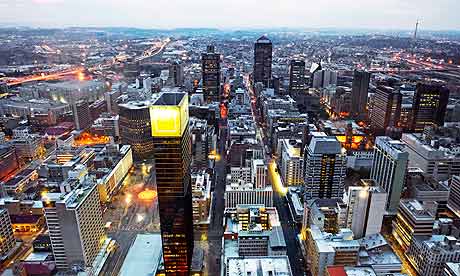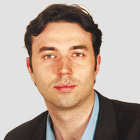Johannesburg: A magnet for millions, but not yet a truly world city
South Africa's largest city draws people from all over the continent and beyond – but many are just passing through

On a balmy evening, we sat around a long table overlooking a garden and a swimming pool. Thanksgiving dinner, that most American of rituals, had come to Johannesburg in South Africa.
I was the sole Brit among a dozen US expats – my accent had never sounded so Monty Python – and joined in the talk of iPods and iPads, Barack Obama's prospects in 2012 and the struggle to find meat, fish and yoghurt in Johannesburg that can match that in the US, the consumer capital of the world.There is a cliche that Americans are insular beings who seldom own passports, but it seems to me that here they are more numerous – and conspicuous – than any other non-African expats.
In recent weeks, I've met people from New York, Texas, Louisiana and Mississippi. A film-maker from California said: "I've travelled a lot, but South Africa was the first time I felt I'd come home.
"There were a lot of similarities, like the weather and landscape and food. It felt very comfortable. But the energy was completely different – open, untamed, a sense of possibility."
Just as South Africans in London congregate in Wimbledon, there is an American enclave north of Johannesburg, near the American International School in Bryanston. But they come out in force for certain events, such as last week's exhibition and auction of pictures by João Silva, the New York Times photographer recently injured in Afghanistan.
While other foreign ambassadors keep a low profile in Pretoria, America's Donald Gips can be found writing newspaper columns and giving interviews. His officials are seen at public events, posting messages on Twitter and discussing WikiLeaks on radio and television.
Brooks Spector, a former US diplomat, is now the acting chief executive of South Africa's most famous playhouse, the Market Theatre. Guests at first nights of major productions often include representatives of the US grant-making body the Ford Foundation, another active presence here.
Professor Lee Berger, from Georgia, is the Wits University palaeontologist who made the recent discovery of 1.9m-year-old skeletons that he claims belong to a previously unknown human ancestor. He described the fossils as a "Rosetta Stone" in understanding human evolution.
But what of other nationalities? Johannesburg is a magnet for people from all over the continent, including most of an estimated 2 million Zimbabwean refugees, but does not yet rank as a truly world city.
From memory, I've met three Australians, one Brazilian, two Canadians, one Dutch, two French, two Germans, one Indian, one Italian, two Swedes, one Taiwanese and one Thai and a dozen or so Brits, but many are journalists and others just passing through. I don't recall bumping into a single Chinese, Russian or Spaniard.
One day, I was invited to lunch with the Norwegian ambassador to South Africa. He asked a question along the lines of: what do you know about Norway's activities in Africa? I wrestled with a blank expression, like Josh Lyman in The West Wing, and then asked him to tell me more.
Go back further in time and South Africa has a rich history of immigration – black Africans from the north, Dutch traders in the 17th century, imported slaves from Indonesia, India-Ceylon, Madagascar and Mozambique, then the British, including the 1820 settlers.
Last month marked the 150th anniversary of the arrival of the first indentured workers from India – their descendents now make up 2.5% of the population but, the government noted, punch well above their weight.
A compelling TV series, Have You Heard from Johannesburg, reflected on the antagonism between Afrikaners and the Dutch during apartheid. The Dutch held street protests, invited Oliver Tambo, of the African National Congress, to speak and mounted exhibitions at the Anne Frank Museum in Amsterdam condemning the new Nazism in South Africa.
They regarded the Afrikaners as a rotten apple that fell far from the tree. The Afrikaners felt isolated, alone and betrayed by their parents.
Afrikaners remain prominent in South Africa today, but white people of British descent seem less so – perhaps in a characteristic strain of understatement. Except, that is, in certain neighbourhoods of Cape Town or, I have discovered, in cinemas broadcasting a play from the National Theatre in London.
Of course, Britishness comes with certain symbolic expectations. The UK high commission – which has tweeters of its own – invited me to a screening of the Last Night of the Proms. The South African media were keen to know what I thought about Prince William's engagement to Kate Middleton. There was a minor rumpus when South Africa's national public broadcaster failed to cover the royal announcement on its evening news.
But does being far from home help define my nationality, sharpening my awareness of what Britishness means? Not really. Victorian explorers might have felt sweet pangs of yearning, like lovelorn teenagers, for the mother country – but, in the digital age, you are never far from home.
Jeremy Clarkson, Doctor Who and Wolverhampton Wanderers are still on my TV, the Guardian and the Telegraph are still on my screen, the sounds of Start the Week and I'm Sorry I Haven't a Clue still float down the internet. Steve Jobs has killed the Englishman abroad.
And, in any case, in a world of tribalism and arbitrary borders, I'm a non-believer. Nothing in my experience here has persuaded me that nationality is anything more than a convenient label, like supporting a football team, that is ultimately less defining than class, gender, race, religion and other variables.
I generally find I have more in common with an American journalist, or a South African journalist, than I do with a British carpenter or chemist.
Likewise, the political commentator Eusebius McKaiser argues that there is no such thing as a "South African". He wrote recently: "Practically, what does a common South African national identity refer to?
"Do I have to like rugby? Soccer? Cricket? Must I have a braai at least once a month? Koeksisters on Sunday? Obsess about race, perhaps? Cry while watching reruns of the 1995 Rugby World Cup and the following day threaten to leave for Sydney in a fit of seemingly typical South African mania?

